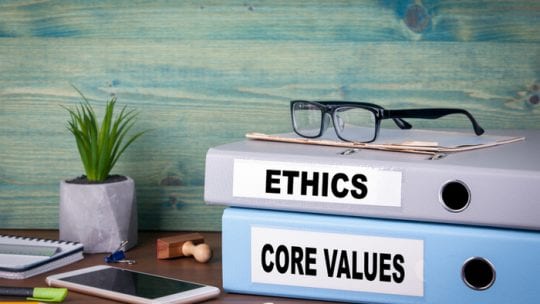
PR professionals become the voices and representatives of companies and organizations we serve. As the main mediators between business leaders and media, we often are most responsible for the integrity, transparency and truth of the information we carry between the two. That’s one reason why ethics is intrinsic to our work.
Communicators can encounter several ethical quandaries daily, especially during a PR crisis. As we know, a PR crisis can cast a menacing spotlight on a company, business leader, celebrity or product. In such cases, reputations can be ruined when communication is handled improperly or unethically. As such, it is a PR pro’s moral duty to value truth and integrity.
The PR pro’s ethical obligation is three-fold: to ourselves, to those we represent and to our media partners.
Obligation to Yourself
Any individual, regardless of industry, will—explicitly or subconsciously—act and make business decisions based on a set of core values. Accordingly, it is crucial that PR pros establish values at the outset of their careers.
In addition, the communicator should revisit these values regularly, ensuring they remain aligned with the principles that define them as a professional and human being.
To establish core ethical principles, PR pros must ask difficult questions:
- What do I value?
- What kinds of companies and people should I support?
- What stories do I believe in sharing?
- How will I behave when no one is watching?
Understanding and holding ourselves accountable to these values cultivates the kind of reputation and good faith necessary to drive positive outcomes in our business.
Obligation to Those you Represent
Our work includes distilling company messaging, mission and momentum and communicating them clearly to the right audiences. Accordingly, the PR pro may engage in confidential conversations about business strategies. We must respect this confidentiality.
In addition, we have an ethical obligation to vet press opportunities, act respectfully and responsibly while representing the company and offer researched, reputable guidance. We should choose projects wisely, ensuring the ethos of those we represent align with ours.
Obligation to the Media
Without the media, there would be no PR work. Communicators rely on developing productive partnerships with media and cultivation of stories we believe their audiences want and/or need to hear.
That said, we know the journalist’s challenges. With the rise of user-generated content platforms and circulation of fake news, media has suffered catastrophic credibility blows. Despite this, trustworthy media personnel far outnumber bad actors.
Therefore, it is the PR pro’s duty to support and uplift trusted media members. We should send media validated, researched, relevant and fact-checked content.
Ethical Values at the Outset
In sum, establishing ethical values early in one’s career and carrying those through every interaction, narrative exercise and encounter with media and the public enables PR pros to not only act with integrity, but informs the kind of companies we represent.
Moreover, an ethical foundation can help us achieve the goals and impact we initially set out to make in this world on behalf of those who have entrusted us with their stories.
Nicole Rodrigues is founder & CEO, NRPR Group
[Editor's Note: The writer’s views do not necessarily reflect those of PRNEWS. We invite opposing essays from readers.]
